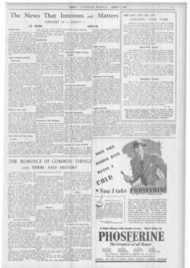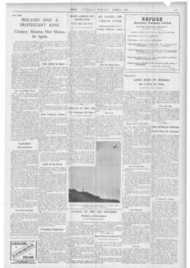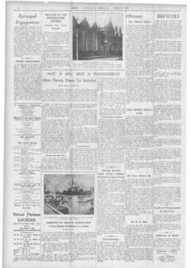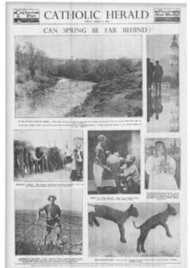Page 5, 5th March 1937
Page 5

Report an error
Noticed an error on this page?If you've noticed an error in this article please click here to report it.
Tags
Share
Related articles
The General Who Shall
Gen. O'duffy Accuses Capt. Mccullagh And Efen S Rich Brigade
" From The Spanish Battlefields"
General Franco Warns
The General Who Shall Take Madrid
BY FRANCIS McCULLAGH
I T would not be correct to say that General Varela, who is besieging
Madrid, is the ablest and most popu
lar of the Spanish military leaders who are serving under General Franco, but it would be difficult to say which of them stands higher in point of ability or of popularity.
General Mola is perhaps a better strategist and Colonel Jagtie has more dash, but for a good combination of military science and audacity. Varela would be hard to beat. The mere fact that the Generalissimo selected him for the extremely important task of taking Madrid is a strong point in his favour.
Personal Bravery What endears him most to the troops under his command is his personal bravery, for which he was twice awarded the laurel decoration, being the only soldier in Spanish history who has twice received this, the highest decoration for valour.
During his military career he has been ten times wounded and, though now back on the Madrid Front, he has not yet quite recovered from the wounds received several months ago, when closing in on the capital. Possibly, Madrid would have fallen ere now, had he not been wounded at a critical moment in the advance.
It was at Villanueva del Pardillo that he was wounded by shots fired from a Russian tank only six hundred yards distant. He was examining the enemy's position through his binoculars, and that fact, together with the group of staff officers around him, must have convinced the Russian that he was a high commander, whereupon, with very good judgment, unfortunately he began firing.
The General immediately shouted to his soldiers to take shelter, shouted jokingly and cheerfully, as his habit is. To one young soldier, engaged to be married, he said, " What would your fiancee saflf she saw you standing rooted there with your mouth open so wide? "
Knowing from Experience But he did not take shelter himself, and one of the last shots fired by the tank wounded him slightly. Even then he showed no signs of fear, and moved off slowly towards a place of shelter without telling anybody that he had been hit.
" Me tnolestaban bastante." he said afterwards, "pero hay heridas que no perm/ten esias cosas. Yo tengo ya cierta experiencia en esto." (1 felt the pain, but there are wounds which do not permit one to do those things. I have bad a certain amount of experience in the matter of wounds.)
Recklessness such as this makes a great impression on the Spanish soldier and perhaps it is necessary for a Spanish General to make such an impression, but foreign officers who served in the Great War are, as a rule, less impressed, believing, as they do, that for the sake of his own men and of the cause for which he fights, a G.O.C. should be at least as careful of his own life as he is of the lives of those under him.
Wounded Ten Times
But General Varela has never been careful of his own life, and the result is that, as I have just remarked, he has been wounded ten times, once in this war and nine times in Morocco.
Most of his military experience he acquired in Morocco, to which he first went as a young lieutenant, and which he left as a colonel.
But the danger he runs in Spain is greater than the dangers he ran in Morocco, as in the latter case he fought the badly armed tribesmen of the Riff, whereas he is now fighting experienced French and Russian soldiers who are apparently making special efforts to " get " him.
Once at Boadilla, when he was walking with his adjutant on a road near the enemy's lines, he suddenly caught sight of a Russian tank only thirty paces off.
" See what's coming," he said to his companion, at the same time hiding behind a thick tree, and then pulling the adjutant in behind him. Apparently the tank did not sec them dearly for it fired only one shot in their direction and then moved off.
Bombing the General
At Antequera he had a similar experience, but his worst was on the way to Toledo.
He was walking along a road with all his staff, behind their motor-cars, when, on reaching a bridge which the Reds had just blown up, he saw no less than thirty enemy planes approaching. And they saw him, and probably guessed who he was from the large number of motor-cars, for hardly had he taken refuge, with his entourage, in one of the arches which had not been blown up, than they began bombing.
They continued for forty minutes, some of the bombs exploding on the bridge, some falling on the ground and sending into the archway shrapnel, the gases of the explosions and clouds of dust, so that the air became almost unbreatheable.
" When at last they went away," said the General, in describing this scene, " I felt convinced that most of my people had been wiped out; but to my amazement they were all safe and sound."
Efficiency of Spies
I remarked above that the Reds seem to make special efforts to " get " Varela, and here I. would like to add that they must often be given the necessary information by their spies, for sometimes a number of Bolshevist sympathisers are left behind in villages which the Bolshevist troops have lost, and probably some of the motor drivers in the service of clhAlslatietnalists.are agents of the Reds.
. This is supposition on my part, but it is difficult to explain otherwise the rapidity with which information sometimes gets from Salamanca to Madrid.
One morning when G.H.Q. had secretly sent away all their chasing airplanes from Salamanca in order to take part in a great aerial raid on Madrid, the Red aviation made a sudden swoop on Salamanca.
All the circumstances pointed to treachery. I even heard one well-informed Spaniard say that the traitor must be in G.H.Q. itself. However that may be, it is certain that there are plenty of spies in both camps, but their work is so risky that I cannot imagine anyone doing it for money; extreme fanaticism, violent hatred, an overpowering thirst for revenge—these can be the only motives.
(To be continued next week).
blog comments powered by Disqus

















